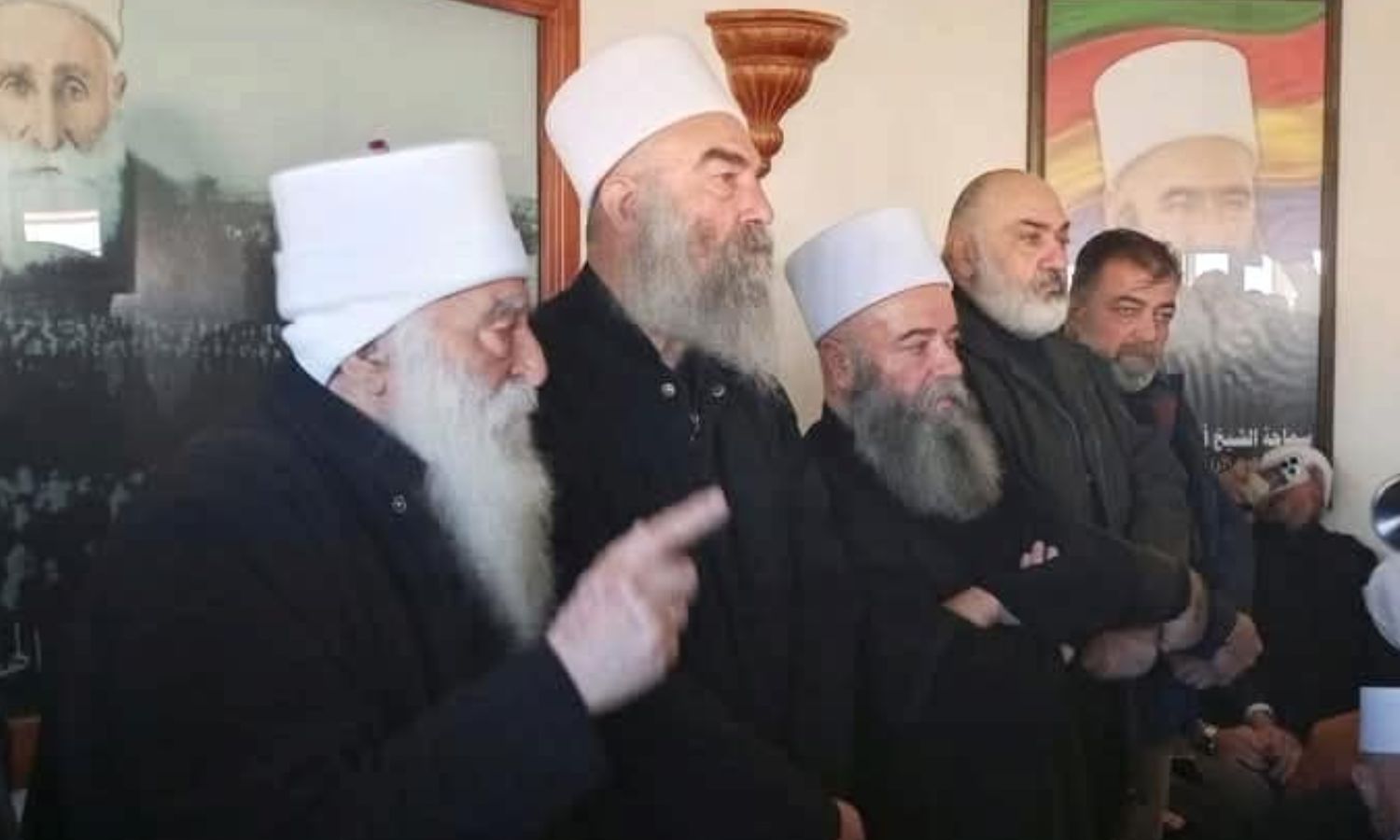
The three sheikhs of the Druze community in Suwayda have issued statements declaring clear positions against the Damascus government—a shift that brings Sheikhs Yusuf Jarbou and Hammoud al-Hanawi in line with the stance long held by Sheikh Hikmat al-Hijri.
Suwayda witnessed bloody events in mid-July, leaving at least 1,013 people dead, according to the Syrian Network for Human Rights.
Local factions, government forces, tribal fighters, and Bedouin groups were involved, alongside Israeli intervention against government forces.
Al-Hijri Praises Israel and Calls for Investigation
Al-Hijri, the most outspoken critic of the Damascus government, said in a video released by the “Spiritual Leadership of the Druze” on August 9 that Suwayda had recently suffered “a series of crimes that can only be described as a methodical genocide carried out in cold blood,” accusing the authorities of imposing “a suffocating siege that lasted for weeks, cutting off water, electricity, and food in an attempt to break the will of an unbreakable people.”
He described the events as “not isolated excesses, but a silent extermination plan carried out in plain sight of the world.”
Israel, for its part, has claimed it intervened “to protect the Druze,” striking government forces near Suwayda and targeting the Ministry of Defense headquarters and the presidential palace in Damascus.
In his statement, al-Hijri said, “Using starvation as a means of pressuring civilians is not just a violation but a war crime,” condemning “disinformation campaigns led by state media and certain pro-government channels.”
Meanwhile, aid convoys have entered Suwayda—the latest on August 6—when Enab Baladi’s correspondent in Daraa reported the arrival of 20 trucks from the King Salman Humanitarian Aid and Relief Center, along with 29 trucks from a joint UN–Red Cross mission, coordinated with the Syrian Arab Red Crescent.
Al-Hanawi and Jarbou Join al-Hijri
Sheikh al-Aql Hammoud al-Hanawi, in a statement published the same Saturday, declared that there was “no covenant or pact” between Suwayda and the Damascus government—a clear departure from his previous stance.
In a recorded video, al-Hanawi said, “We have been afflicted with an authority that has no honor; it sold the homeland and betrayed its people before it betrayed its borders, and it has been a drawn sword over the necks of the innocent, driven by extremist ideas that permit bloodshed.”
Sheikh Yusuf Jarbou issued a simultaneous statement, aligning himself with the positions of al-Hijri and al-Hanawi.
“We stand today witnessing clearly the destruction caused by this aggression, which came under the pretext of ‘restoring state control’ but in reality gave cover and protection to an ‘army of Tatars who wreaked havoc, killing defenseless civilians without justification”
Sheikh Yusuf Jarbou
He described these acts as “sectarian barbarism” amounting to “an attempt at systematic ethnic cleansing” and called them “a true betrayal of the entire Syrian people, stripping this clique of any legitimacy to govern.”
Jarbou held the countries supporting the Damascus government responsible, urging them to change their stance, and thanked Druze spiritual leader in Israel, Sheikh Mowafaq Tarif.
Suwayda’s three leading Druze sheikhs are Hikmat al-Hijri, Yusuf Jarbou, and Hammoud al-Hanawi. Al-Hijri has consistently been the most openly critical of the Syrian government during the recent events, while Jarbou has oscillated between cooperation with and condemnation of Damascus, and al-Hanawi had largely remained silent until now.
During the earlier events in Jaramana and Sahnaya—before the Suwayda escalation—Jarbou and al-Hanawi, unlike the confrontational al-Hijri, traveled to Damascus and, alongside Sheikh Leth al-Balous, commander of the “Sheikh al-Karama” forces, played a mediating role, reaching an agreement through coordination with the leadership of the Daraya area in rural Damascus (adjacent to Sahnaya).
The post Druze Sheikhs in Suwayda Unite in Opposition to Damascus appeared first on Enab Baladi.